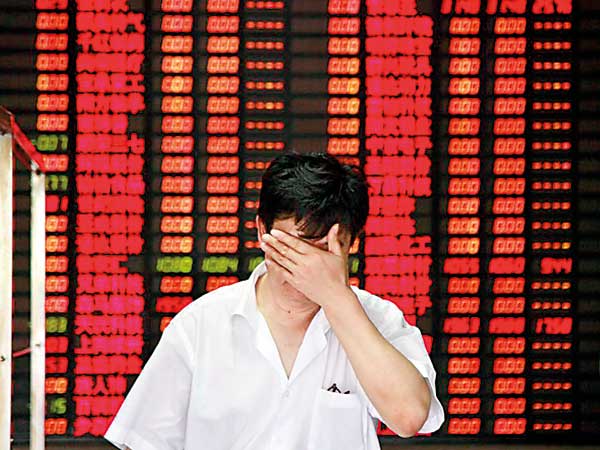Reply To:
Name - Reply Comment

By Ellen L. Frost
The sudden, sharp fall of Chinese stock prices twice in 2015 and again this month does not necessarily herald a further slowdown of gross domestic product (GDP) growth. But investor confidence, the bedrock of a healthy economy, has been shaken both in China and throughout the world.
As Chinese leaders struggle to implement market-based reforms, a severe economic crisis that causes social disruption cannot be completely ruled out. In such a case, what might happen?
In current circumstances, China’s policymakers have a few monetary or fiscal cards to play. The People’s Bank of China has already cut interest rates several times, reduced banks’ reserves requirements and allowed the currency to fall. A major stimulus package protected China from the global recession of 2008–09, but it cannot be easily replicated without expanding the existing pile of bad loans and thwarting Beijing’s efforts to reduce the share of investment in the economy.
China’s future policy towards other countries and international institutions would depend, in part, on how much leverage it has over others and what its reputation is. Money talks, and China still has lots of it — despite drawdowns of roughly half a trillion dollars in its foreign exchange reserves in the latter part of 2015. Despite the crisis, China’s trade and investment partners would continue to promote deeper economic engagement.
Yet, a hard landing would spread alarm and exacerbate the pain already felt in those economies whose prosperity has depended on exports to a booming Chinese economy. Australia, Japan and developing Asia are all at risk of a further slowdown. Some might resort to beggar-thy-neighbour currency devaluation. The United States, too, will suffer losses, but its relative influence will rise if its economy can shrug off the Chinese downturn.
A sharp and prolonged Chinese economic crisis would seriously dent China’s leverage abroad. China’s great-power stature depends heavily on its high growth rate. Although talk of a ‘Beijing Consensus’ was misplaced, at least some aspects of China’s economic model appealed to leaders and intellectuals in certain developing countries. That model would no longer be as attractive to them as it once was.
A hard landing would diminish the chance that China would assume new leadership roles in the International Monetary Fund (IMF) and multilateral development institutions, beyond the senior positions it already holds. While continuing to participate constructively in those institutions, Beijing would continue beating the drum for its own funding mechanisms, especially the Asian Infrastructure Investment Bank.
Troubles at home would likely cause the Chinese government to pursue its ‘One Belt, One Road’ initiative more urgently than ever. Large Chinese-funded infrastructure projects typically employ Chinese labourers rather than local people. When the global recession of 2008–09 shrank China’s overseas markets, an estimated 20 million migrant workers lost their jobs. Ordinary Chinese may not care about GDP growth rates, but job losses are personally devastating and politically destabilising. Large international projects may therefore be promoted in order to absorb unemployed Chinese, but concessional aid associated with infrastructure development could face cutbacks.
Trans-Pacific Partnership membership
If Chinese policymakers decide to seek membership in the Trans-Pacific Partnership (TPP), perceived weaknesses in China’s economic future would diminish Beijing’s leverage. But Chinese economists and reformers would still support
TPP membership because accession would force the government to step up the pace of economic reform. China’s reformers could use the TPP’s high standards as an excuse for pushing through unpopular reforms, just as Japan used gaiatsu (outside pressure) to justify reform in the 1980s and 1990s.
One possible Chinese reaction to growing social unrest could be a campaign to whip up more nationalist sentiment over issues such as Taiwan or the South China Sea. Less alarmingly, China would continue to pursue ‘rival regionalisms’ that are in implicit geopolitical competition with those initiated or endorsed by Japan, South Korea, the United States, India and Russia. China’s support for Association of Southeast Asian Nations (ASEAN)-led initiatives would remain steady.
On the upside, economic hardship might finally be what it takes for a successful conclusion of the long-running, off-and-on negotiation of a comprehensive free-trade pact between China, Japan and South Korea. The 2012, trilateral investment agreement, trilateral summits such as that held in 2015, and the recent agreement by Japan and South Korea to officially resolve the ‘comfort women’ issue are all positive steps in this direction. Since a hard landing in China would drag down the South Korean and Japanese economies, their respective leaders might support a free-trade agreement despite some domestic opposition. Such opponents might try to stimulate nationalist feeling by blaming China for exporting unemployment.
If one were to look for a silver lining, a hard landing in China would slow the pace of environmental destruction and illegal trafficking. But shrinking markets, political instability, nationalist flag-waving and widespread human suffering would destabilise the entire Asia-Pacific region and send shock waves through the entire world economy. If China does experience a hard landing, it will take years to correct the underlying structural causes and restore China’s economic reputation.
(Courtesy East Asia Forum)
(Ellen L. Frost is a Senior Advisor at the East West Centre’s Washington DC office)